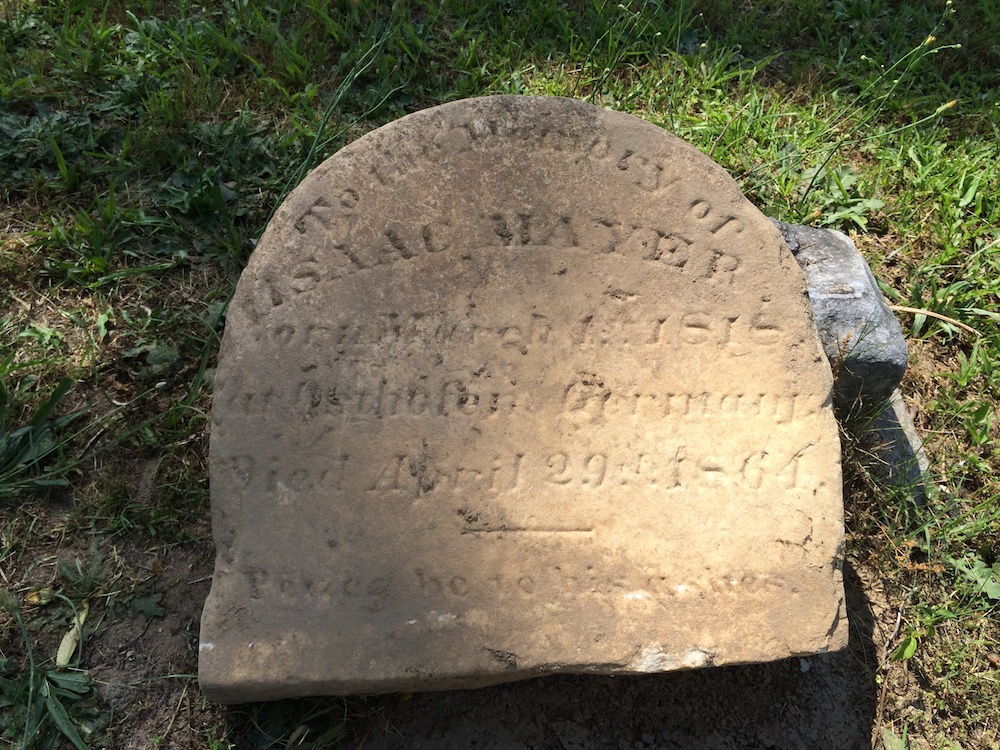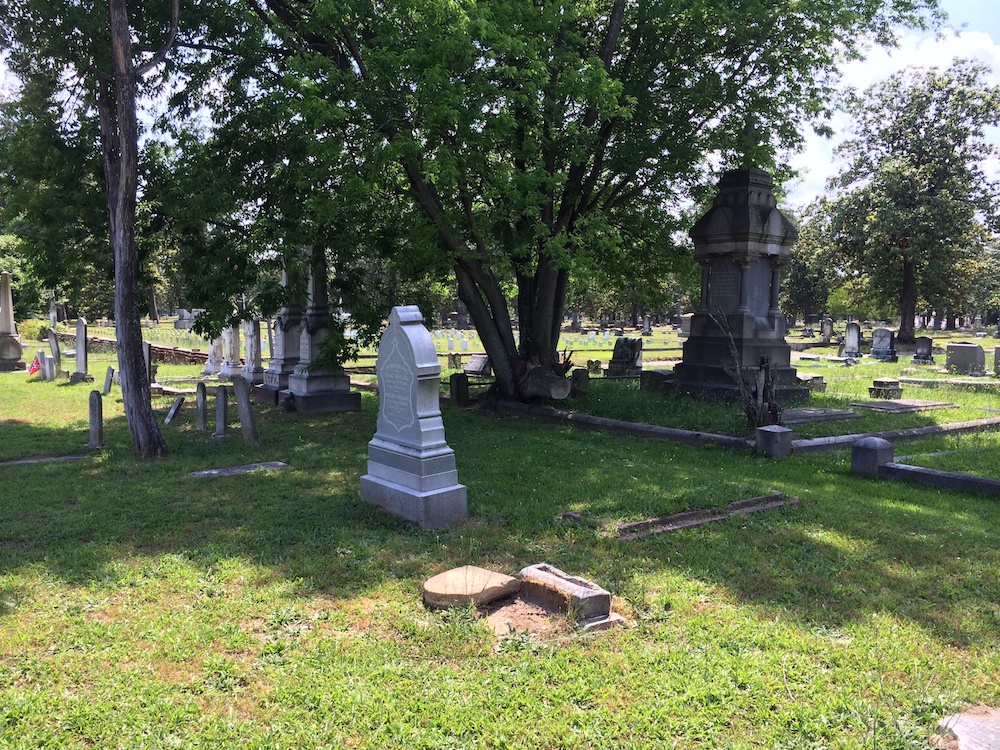In Memoriam.
Major Isaac Mayer, who died at his residence in Augusta, GA, on the 29th day of April, 1864, in the 46th year of his age.
In terms similar to these we are accustomed to record the passage of all immortals through the shadowy portals which open from earth into the Infinite.
The brief words, he was born, he lived, he died, sum up all human history. The joy which hails the newly born spreads little beyond the household. The mature life may make its energies felt upon the pulses of a world. But whether that life belong to the quiet and unpretending citizen, to the eloquent statesman, or to the mighty conqueror, yet, when the curtain lifts upon the third act of the drama, the shadows of the tomb seem to reach out to darken and obscure. The busy energies of the life in the world contract the narrow limits of the sick chamber. One by one the chords which unite to the busy multitude outside are severed. The silent footfall and sad faces of a few true friends take the places of the joy of life’s morning and the noise and glare of its noon. A mighty angel spreads the shadow of immortal wings above the place, and the great and the humble alike, pass out into the invisible light, even more quietly than they entered the world. Then that world sees in a paper, or hears from the tongue of a bell, or the funeral music of the slow procession, or beholds among the black plumes a hearse; the last words of life’s common history–he died.
The record today is of “an Israelite indeed, in whom there was no guile.” One of that ancient race whose Moses and Joshua, and Gideon and Saul, are prouder and older names than Alexander and Hannibal, Napoleon and Washington.–Whose Oracles, speaking from the Mercy-sect, and beneath the extended wings of the Cherubim, are of authority now, while the groves of Greece, the Delphie Mysteries, the auguries of Rome, as well as those older rites which the Chaldese learned beneath the stars that looked on Babylon, or the Egyptians practiced in the chambers of the Pyramids, only live in tradition and fable.
The race that have preserved amid wars and captivities, the primal history of the world, and the first revelations of its Creator; whose long and authentic genealogies put to shame the boasted ancestry of the noble earth, who are proud to trace their blood from such recent things as a Crusade or Norman invasion; whose deeds of arms live upon the painting and the marble, by which Syria, Egypt and Rome strove to bride the old tomb-builder, Time, into marking his path with something besides dust and decay; whose prophets learned of the future from God; whose Seers talked with Jehovah and his angels; whose poets taught Chilton and Homer to sing; whose kings begun with such names as David and Solomon; whose city was Jerusalem; whose sanctuary was the Temple; whose law is the basis of all civilized codes; and who, even now, although dispersed, persecuted, oppressed, furnish historians, warriors and statesmen in all lands; and who, strange to tell, are most hated by those who swear on their Holy Book, and worship a God who was born of their blood.
Isaac Mayer was a Jew, and so were David and St. Paul, the Apostle Peter, the historian Josephus, and the incarnate object of Christian worship, Jesus Christ.
Born in that fatherland from whence come the most successful agriculturists of the new world, he was thoroughly German; delighting always to tell of its beautiful cities, its blue rivers, and vine-clad hills; although always a good and true citizen of this adopted country, yet never giving up the hope of returning to the land of music, and pipes, and wine.
A successful importer of the wines of the Rhine, and prominent for years among the business men of Augusta, esteemed among those companions of the Holy Royal Arch, who called themselves Masons, it is of little use to tell who or what he was to a community in which he lived and died.
A keen sympathizer with the South in the revolution called secession, he was among the early volunteers, and when Brigadier General Capers was in command of the Second State Brigade at Savannah, our friend accepted the appointment of Brigade Commissary, and wore worthily the stars of Major.
During a long illness he was always rational, always patient, always the kind husband and father, and friend he had lived, sanctifying with a pious death the life of generous usefulness.
The writer did not see him die, but in the last visit he whispered, “They have sent for me and I must go.” The parting with loved ones, which made his lips quiver then, is over now, and brighter skies than those of this own loved Germany bend above him now. He drinks from the sweeter waters than the health giving springs of that distant home; sees richer verdure than the vineyards of the Rhine, and the angels know grander songs than those of the immortal composers of the home of music. The procession of citizen soldiery, brethren of the Mystic tie and assembled friends, was not so grant, and far more sad, than the escort of glorious spirits, who sang through the fields of air of a death on earth and a birth in heaven; who led him to that lodge, that needs no keystone and no pillars into the presence of that only Grand Master of the universe, whose Mastership can never be recorded as Past.
They “sent” for you old friend; the sickness was but to sever the strong chords of mortality. They waited in the chamber and smiled a welcome while others wept at parting; they opened the doors of pearl, whose golden hinges turn so softly that mortals never hear them; they led you through into the ineffable light beyond; and we, who know you are gone, and who miss you so much, will plant flowers above your dust; and when they bloom will dream among their fragrance of the home you have gone to, where creeds are forgotten; where wars are no more; where the Jew and the Gentile may meet in the Holy of Holies.
A. Christian
Wednesday, May 4, 1864
Daily Constitutionalist (Augusta, Georgia)
Volume: XXI Issue: 106 Page: 2


 Kind and generous people have become somewhat of a rarity, but they are truly a blessing when they are a part of your life. One of these people is a student at Gordon-Conwell Theological Seminary named Preston. He goes to my church, attends the same Bible study as me and who hails from a town near Augusta, Georgia.
Kind and generous people have become somewhat of a rarity, but they are truly a blessing when they are a part of your life. One of these people is a student at Gordon-Conwell Theological Seminary named Preston. He goes to my church, attends the same Bible study as me and who hails from a town near Augusta, Georgia.